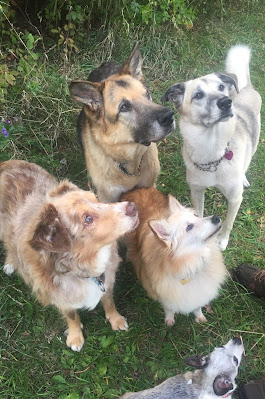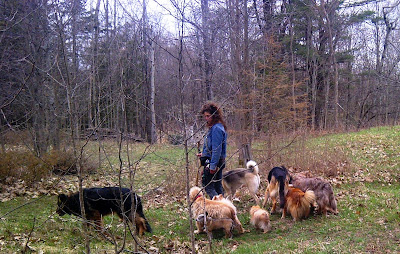DEBUNKING THE ALPHA DOG MYTH
Many people think their dogs are 'Alpha' dogs but the term Alpha is not correct. I think it's important to understand the story about how the term was initially established, what has happened to the term since and, how our domesticated dogs really establish their pack structure.
In reference to wolves, L. David Mech, PhD
first coined the term ‘Alpha’, while studying packs of unrelated wolves. He has
since done his utmost to convince publishers to stop printing his earlier works
were he first defined the term Alpha. Alpha was a term developed to describe a
dominate individual at the top of a hierarchical structure.
To quote David Mech…
'The concept of the
alpha wolf is well ingrained in the popular wolf literature at least partly
because of my book "The Wolf: Ecology and Behavior of an Endangered
Species," written in 1968, published in 1970, republished in paperback in
1981, and currently still in print, despite my numerous pleas to the publisher
to stop publishing it. Although most of the book's info is still accurate, much
is outdated. We have learned more about wolves in the last 40 years then in all
of previous history'.
'One of the outdated
pieces of information is the concept of the alpha wolf. "Alpha"
implies competing with others and becoming top dog by winning a contest or
battle. However, most wolves who lead packs achieved their position simply by
mating and producing pups, which then became their pack. In other words they
are merely breeders, or parents, and that's all we call them today, the
"breeding male," "breeding female," or "male
parent," "female parent," or the "adult male" or
"adult female." In the rare packs that include more than one breeding
animal, the "dominant breeder" can be called that, and any breeding
daughter can be called a "subordinate breeder."
And from another
extract of Mr. Mech’s…’
'However, in natural
wolf packs, the alpha male or female are merely the breeding animals, the
parents of the pack, and dominance contests with other wolves are rare, if they
exist at all…The only consistent demonstration of rank in natural packs is the
animals' postures during social interaction. Dominant wolves assume the classic
canid standing posture with tail up at least horizontally, and subordinate or
submissive individuals lower themselves and "cringe" (Darwin 1877).
In fact, submission itself may be as important as dominance in terms of promoting
friendly relations or reducing social distance'.
SO
HOW ABOUT DOMESTICATED DOGS?
Much like the wolf, the domestic dog has evolved genetically to live in social groups. Wolf packs in their natural state (not captive) consist primarily of related animals. The dog, however has lived with man for thousands of years and has adapted its social behavior to live with humans, in dog packs comprised of various breeds of dogs.
Dogs that live together in human house holds base their
social structure on one of three social structures; none of the structures include a pack leader. All three structures are dependent on dominant
and submissive behaviors among the dogs as opposed to leadership by one dog.
One - Despotic Social Structure
A despotic (tyrannical) social structure occurs when one dog
takes and maintains control of the other dogs - the other dogs submit to the
despotic dog. This tends to be a fairly stable structure. However, it can be a less than desirable structure if the despot is practicing undesirable behavior...for example reactivity to guests...behavior is transferable and learned from one dog to another. If the despot is a well balanced dog - then there is no issue and the structure can be one of positive stability.
Two - Linear Social Structure
A linear social structure occurs when one dog keeps the next
dog in line, that dog then keeps the next dog in line and so on down the line.
This social structure is based on a sliding scale of submission and is a fairly
stable structure.
Three - Triangular Social Structure
A triangular social structure (not necessarily limited to
three dogs - it can be comprised of more than three dogs) is a structure in
which competition and fights for control of resources (for example food, toys,
space) is constantly underway - this is a very unstable social structure.
I
live with a pack of 10 dogs. The dogs are not related by blood, they are
instead a pack brought together by a human - they are primarily rescues. They
range in size from 4 lbs to around 75lbs and are various breeds, and mixes: Pomeranian,
Chihuahua, Shetland Sheepdog, American Cocker Spaniel, Australian Shepherd,
Boxer, Siberian Husky, German Shepherd (Alsatian) Belgium Shepherd (Groenendael)
and Alaskan Malamute.
There
is no one leader in my dog pack; instead their social structure is linear. In
some situations one dog will take the lead, in another situation another dog
will take the lead. The reason my pack’s social structure is linear is because
I take a leadership position - coaching and mentoring to ensure that despotic
and triangular behavior does not occur.
Despotic behavior normally results from a lack of leadership on the humans part and is not - in my mind - a desired outcome as it can lead to issues and unwanted behavior. This is even more so for triangular social behavior as escalated and reactive behaviors become the norm.
References; Wolf News and Info - L. David Mech, The Canine Mind - UK
References; Wolf News and Info - L. David Mech, The Canine Mind - UK
Holistic Diet, Nutrition, Wellness Services Tailored to Your Individual Dog and Cat
For information about my holistic diet, nutrition and wellness services, visit my holistic wellness services page.
Maintain good health | Address acute and chronic health issues | Pre and post surgery support and recovery
My holistic wellness services are available worldwide via video consultation.
🌎 USA | Canada | UK | Europe | Australia | New Zealand | Asia | South and Central America | Africa | UAE
📱FaceTime | Facebook | Skype | WhatsApp
To set-up your holistic wellness consultation get in-touch via email, go to my contact me page.
Holistic Behavioral Services for Your Dog
For information about my holistic behavioral services, visit my holistic behavioral services page.
For dogs of all ages, sizes and breeds.
My behavioral services are available worldwide via video consultation.
🌎 USA | Canada | UK | Europe | Australia | New Zealand | Asia | South and Central America | Africa | UAE
📱FaceTime | Facebook | Skype | WhatsApp
To set-up your holistic behavioral session get in-touch via email, go to my contact me page.
Affiliations to Companies
✓ None.
✓ I don't sell food, supplements, or other products.
✓ I'm not aligned with any companies.
Article and graphics by Karen Rosenfeld.














